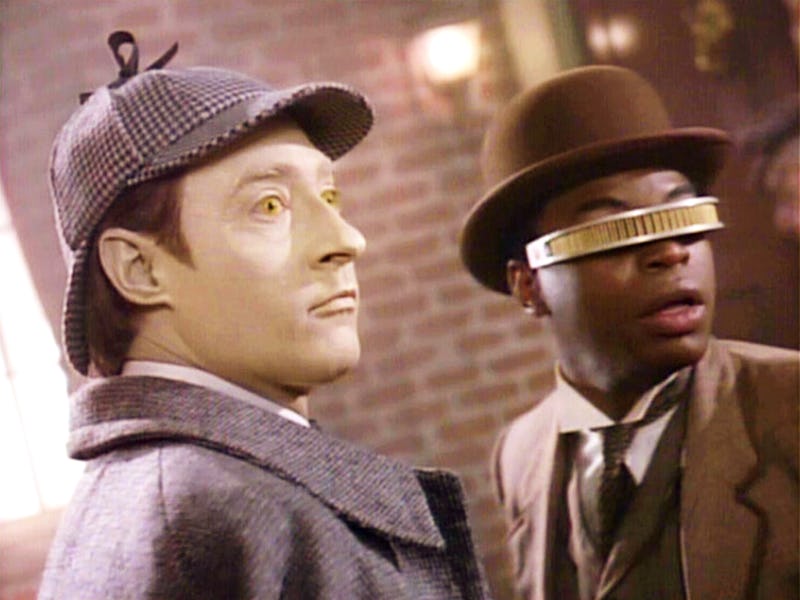35 Years Later, Sherlock Holmes Just Saved Star Trek — Again
In Picard Season 3, the game is still very much afoot.

The greatest detective in all the galaxy is Sherlock Holmes. Or is it Mr. Data? From the classic Trek movies to The Next Generation and Picard, the connections between Sir Arthur Conan Doyle’s hero and Gene Roddenberry’s humanist future are numerous. Trek’s love of Holmes has made the franchise better, and now in the Picard Season 3 episode, “Surrender,” one classic Holmes concept is the key to saving the day. In fact, those big Sherlock Holmes references in Picard Season 3 are deeper than just fun Easter eggs.
Retaking the USS Titan from Vadic and her fellow Changelings occupies most of the plot of “Surrender.” But to get the Titan’s computer back in the hands of Picard and the gang, they need Data. However, since Episode 6, “The Bounty,” Data’s reborn personality has been struggling for dominance against his evil brother, Lore. So the stakes for “Surrender” are clear: If Data can’t beat an evil version of himself, all hope is lost. And it’s here where the episode takes a Holmesian turn.
In Data’s mindscape, Lore is taking Data’s memories away from him, which seems to weaken our beloved android. The first stolen memory is connected to Data’s love of Sherlock Holmes, specifically the fact that Data played Holmes on the holodeck with Geordi back in The Next Generation. This references the TNG episodes “Lonely Among Us,” “Elementary, Dear Data,” and “Ship in a Bottle,” while also referring to the recent reappearance of a holographic Moriarty in the Picard episode “The Bounty.” But the flashback dialogue we hear is more revealing than a simple reference.
In dialogue taken from “Elementary, Dear Data,” we hear a younger Data say, “Holmes collected nothing, neither trinkets nor thoughts that were not specifically significant to him.” This comes from the very first Sherlock Holmes novel, A Study in Scarlet, in which Holmes explained to Watson that he viewed his brain like an attic:
“...you have to stock it with such furniture as you choose. A fool takes in all the lumber of every sort that he comes across so that the knowledge which might be useful to him gets crowded out, or at best is jumbled up with a lot of other things so that he has a difficulty in laying his hands upon it. Now the skillful workman is very careful indeed as to what he takes into his brain-attic...It is of the highest importance, therefore, not to have useless facts elbowing out the useful ones.”
Brent Spiner as Data in Picard Season 3.
In the TV series Sherlock, the idea of using a well-ordered brain as a superpower was called Holmes’ “mind palace,” and this episode of Picard is basically set in Data’s mind palace. As Data continues to hand over memories to Lore, including his Sherlock Holmes pipe and deerstalker cap, we eventually realize Data is playing the long game. He knows Lore values Data’s memories, and that Data has a much better-organized brain than Lore.
Data’s trick to beating Lore is straight from the mind palace playbook. Data tells Lore, “I merely discovered the error in your deception; that my memories are not without value to you... you took the things that were me, and in doing so, you have become me.”
And thus, Data is essentially reborn as an almost human character. Throughout Trek canon, various writers — including Picard’s Michael Chabon — have added Holmesian touches to Trek storytelling. And with Picard Season 3, showrunner Terry Matalas, writer Matt Okumura and director Deborah Kampmeier have doubled down. Because Data is hyper-rational and incapable of missing even the smallest details, his interest in Holmes has always made sense. But until now, Data could never be a true Star Trek version of Sherlock Holmes, because he was too innocent and devoid of human emotion. On the page, Holmes isn’t just coldly logical like a Vulcan, or capable of processing information quickly like an android. He’s also flippant, funny, and full of passion.
When the new Data introduces himself to the crew, he tells Riker, “Oh, I am mostly myself, I assure you, albeit with a dash of computational joie de vivre.” This Data is reveling in the joys of living in a way previous versions of Data couldn’t. And so the new Data is the closest to Sherlock Holmes, as he’s capable of many moods, obsessions, and the ability to crack jokes.
Sherlock Holmes has proven a reliable inspiration for Star Trek over the decades, not just because Holmes is smart and Star Trek characters are smart, but because Holmes represents a fascinating juxtaposition of intellect and heart. And now, with the newest version of Data, the Trek canon is finally giving Holmes a run for his money.
Star Trek: Picard Season 3 airs its final two episodes over the next two weeks on April 13 and 20 on Paramount+.
This article was originally published on